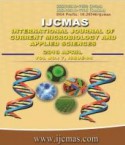


 National Academy of Agricultural Sciences (NAAS)
National Academy of Agricultural Sciences (NAAS)

|
PRINT ISSN : 2319-7692
Online ISSN : 2319-7706 Issues : 12 per year Publisher : Excellent Publishers Email : editorijcmas@gmail.com / submit@ijcmas.com Editor-in-chief: Dr.M.Prakash Index Copernicus ICV 2018: 95.39 NAAS RATING 2020: 5.38 |
India has been experiencing major changes in agricultural extension system since the beginning of the 21st century. The reforms included both demand and supply side measures. Information and Communication Technology (ICT) has become a global tool often used by individuals, organizations, governments and inter-governmental organizations for personal or official activities. Its application cut across all fields of human endeavor like medicine, commerce, engineering, architecture, education, library services, and agriculture. Information and communications technologies have been of great significance in the development agenda of most countries. Information and communications technologies have been of great significance in the agricultural development agenda of most countries due to their critical role in facilitating socio-economic development of farming community. This is because it involves a shift from the traditional resource based method of production to a new science based method and commercialization of agriculture in digital world. The findings indicated that majority of the extension personnel used mobile phone to seek farmers’ participation and to deliver timely extension & advisory services to stakeholders, more than 80.00 percent and about 60.00 per cent of the respondents used most popular social media like Whats App and facebook for extension activities respectively. The less knowledge of farmers about ICTs and lack of specialized trainings received on ICTs by field functionaries were very serious constraints in use of these tools. Loss of competitiveness, loss of contact with timely information and loss of extension management efficiency were the major consequences/concerns perceived by field functionaries for not using the ICTs presently or in near future.
 |
 |
 |
 |
 |